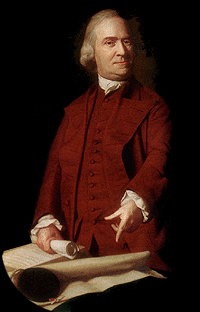The American colonies used every legal means available to them to protest unconstitutional acts of Parliament. When the Townshend Acts were passed in 1767, taxing tea, lead, paper, and glass without any representation on their part in Parliament, Massachusetts took action.
 Under the leadership of Samuel Adams, the Massachusetts assembly wrote the Circular Letter, stating that the measures were clearly opposed to all British constitutional precedents. Not only were they being taxed without their consent, but troops had been sent to Boston to oversee compliance with the Townshend Acts. This, in itself, was tantamount to an act of war against the government’s own citizens since having a standing army living within the populace was decidedly contrary to all common practice.
Under the leadership of Samuel Adams, the Massachusetts assembly wrote the Circular Letter, stating that the measures were clearly opposed to all British constitutional precedents. Not only were they being taxed without their consent, but troops had been sent to Boston to oversee compliance with the Townshend Acts. This, in itself, was tantamount to an act of war against the government’s own citizens since having a standing army living within the populace was decidedly contrary to all common practice.
This Circular Letter, which was sent not only to the other Massachusetts towns but also to other colonies, raised the ire of the royal governor (and King George when he heard of it). The governor demanded that the assembly revoke the Letter, in effect saying that they were wrong. After strenuous debate, they instead confirmed their earlier vote, standing strong on principle.
The Letter, when sent to the other colonies, led to a non-importation agreement among the colonies to put economic pressure on British merchants who depended on the colonial market to sell their goods. Even with no mechanism to enforce any boycott of British products, the merchants saw their sales drop by more than one-third.
That was enough to scare them. They clamored for their members of Parliament to repeal the acts. Parliament, under the gun, did so—except for the tax on tea, which was simply its way of saying that it still had the authority to tax regardless of colonial protests.
While that tax on tea would come back to haunt Parliament later (I’ll tackle the Boston Tea Party in a future post), colonial unity had won the day, all without the shedding of blood and all within the legal system that allowed petition and redress of grievances.
These were not rebellious subjects, but citizens of the empire using constitutional means to achieve their goals—a lesson even for those of us today who are disturbed by all the unconstitutional actions we see in our own government.
